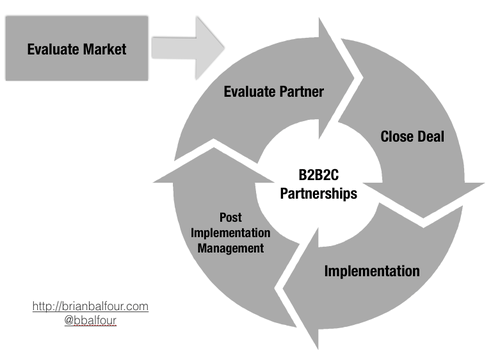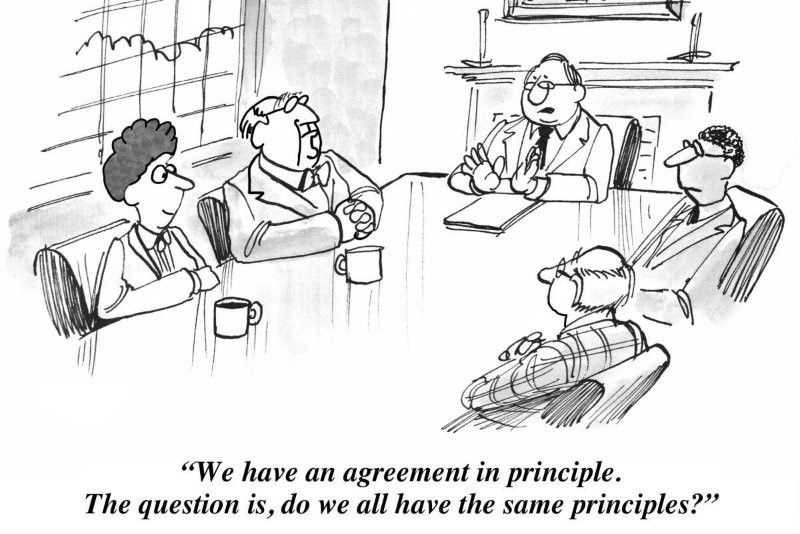(Whenever I say “resellers”, that includes B2B distributors or sales channel partners as well.)
By the end of this article, you’ll have a good idea of the investment (time, effort, money) it takes for such a partnership to pay off. You’ll also be able to avoid the most common mistakes made by startups.
I often see early-stage founders either looking for resellers or being approached by resellers with interest in their products.
Now, there’s no doubt that resellers and sales channel partners can be valuable. With their help, you could possibly generate tens of millions in revenue. This is a massive opportunity and a viable way to grow your business.
But there’s also a lot that can go wrong and sink your startup before it has a chance to succeed.
As the founder or founding team member of 13 startups, mostly in B2B SaaS, I speak from experience. Many times, as soon as our startup had a bit of success, we’d start receiving emails and calls from companies offering partnerships. They’d offer to sell/promote our product, become a distributor/reseller for us, or even cross-sell/up-sell our product to their customers with a revenue share.
As an inexperienced newbie, I saw these partnerships as a golden opportunity. I spent months talking to, negotiating with, and signing contracts with these resellers – but usually, it was a ton of invested time with zero sales.
Over the years, I learned that most reseller partnerships are a huge waste of time, money, energy, and (sometimes) even equity in the early stages. However, when done at the right time and in the right way, they can help you grow your business 10x or more.
Starting with the basics
What exactly is a reseller partnership?
In many sectors, there are big organizations (that may/may not be producing their own products) that also sell other companies’ technology solutions and help implement them. For example, IBM doesn’t just sell their own products – they also consult on and help implement various third-party solutions for their clients.
These companies, called resellers, usually have a large existing customer base and invest heavily to build these relationships over years.
So, you could show these organizations your product, and if they like it, they could use their salesforce to sell it to their (massive) client base. That’s called a reseller partnership.
Sounds awesome, doesn’t it? So, why isn’t everyone doing it?
Well, if it sounds too good to be true, it probably is.
Let me tell you straight up that resellers are not a silver bullet to make your startup successful. They’re not going to help you grow your business unless it’s already growing.
Once you’ve achieved the product-market fit and your startup is on the growth path, then resellers might help you grow faster – not before.
A reseller that helps a startup get its first customers or gain traction isn’t the norm – it’s a statistical anomaly.
Wait for the right moment
You shouldn’t even be talking to a reseller at the Minimum Viable Product (MVP) stage. These organizations aren’t designed for experimenting, interviewing customers, and uncovering insights. They can’t help you adjust and pivot your product to reach product-market fit.
Resellers specialize in building relationships and trust with people in large organizations.
If they take an unproven, unreliable product to their customers, they lose credibility. Then, they may not even be able to sell the other products they were already providing to those clients.
That’s why resellers have a real incentive for selling established products – something that creates tremendous value, that makes them a ton of money, and that customers want, understand, and are ready to buy.
In other words, resellers aren’t in the business of innovating but of selling what already works.
So, here’s my strong recommendation: when you’re in the stage of acquiring your first 10, 100, 300 customers, a reseller partnership is not the way to go.
Wait until you have traction, are growing organically, and are able to sell successfully on your own. When your product is helping customers achieve success, your customers are happy and not churning, and you’re asking yourself how to accelerate this growth – that is the right time to start exploring resellers.
Make the partnership work for you
Even when you’re primed to scale, it still takes an incredible amount of work to make a partnership successful for you.
Brian Balfour – who grew one of his previous startups, Viximo, from zero to millions of daily active users (DAU) through partnerships – describes five stages for executing growth partnerships:
- Evaluating the market. Assess the opportunity at a macro level. Is this kind of partnership repeatable? If yes, how many potential partners are out there? Who’s your ideal first partner? Hint: it isn’t the largest one in the market!
- Evaluating the partner. Assess the opportunity at a micro-level. Find a metric that helps estimate how much the partnership could produce. At Viximo, they looked at DAU and MAU (daily active users/monthly active users). A site with high MAUs but low DAU’s (showing low engagement) produced poor results. Also, ask yourself, is the partner’s culture a good fit for your product?
- Closing the deal. Link your pitch to numbers (be it revenue or savings), and avoid exclusives that limit your growth. When you have a couple of partnerships in place, build anonymized case studies – many potential clients will want to see examples. Finally, try to get some money upfront for the time you’ll invest in integration – this gives your partner a vested interest in the deal.
- Integration. This is the first time both sides work together, and it sets the tone for the entire partnership. Smoothen the way by having a dedicated team and visually planning implementation.
- Post-integration management. As implementation ends, your relationship begins – and it needs nurturing. Ease communication by appointing a point person on either side. Set up regular meetings, continue to upsell, and let your partner know about any changes well in advance.

As soon as you start exploring the possibility of partnerships, you’ll see it’s easy to get a few meetings and get resellers excited about your product. They’ll start bragging about how many customers they have and how this product is suitable for all of them. They might even say, “Just sign the contract and we’ll make this happen.”
It’s what comes after this that’s crucial – and nearly all startups mess it up, at least the first time around.
It’s natural to think, “They have all the information and a signed contract. Now they obviously have enough motivation to push my product.”
So, you can sit back and relax. Right?
Wrong.
This is where your job actually starts. You have a ton of work to do before you can get anything out of your partnership.
Think about it from the reseller's point of view.
These organizations have multiple stakeholders, all kinds of problems, and lots of different departments and people – each with its own priorities, incentives, and politics.
You signed your contract with a person whose job is bringing in new products. At the other end of the organization are the salespeople, who actually go out and sell. (And between these two, your product has to travel through many other departments!)
A salesperson’s goal isn’t to sell a new product – it’s to make the most money possible for their organization, in the easiest way. That’s how they get their huge commissions. Plus, they want to constantly strengthen their relationships with existing customers.
Now imagine yourself as a salesperson who’s just received a bunch of documents about something new. She’s already under pressure to achieve her quarterly quota. She’s selling other products she already knows, to her existing customers (who are also familiar with the existing products).
Why would she spend time learning about this new product?
The only way that’ll happen is if she’s convinced that it’s amazing, it’ll make her big money, it’s going to be easy to sell and customers will love her for introducing it to them.
That’s why, as a startup, even though you spend months talking to resellers before signing the contract – you still might not get a single sale out of it. Most startups end up that way because they simply don’t realize the complexities within large organizations.

Take charge of your own success
Commit to working with your partner for at least 2-4 months before they start selling your product – and at least a few months after. You’ve got to be there, physically and virtually.
You need to go to every person and department between the person who signed the contract with you and the person who’ll sell your product. Convince each one that your product is the next big thing and is going to make them a ton of money.
Practically, it’s best to form a small team inside your company to do this full time. Include a product person, a marketer, a support specialist, etc.
You’ll need to:
- write the announcement of the partnership.
- design your marketing around this partnership.
- work with your reseller's salespeople to create any and all sales material for them.
It’s also crucial to train their salespeople. Accompany sales reps when they go and pitch your product to customers, at least for the first 10-20 times. This will help you identify the kind of questions customers ask, understand your reseller's sales approach, and find out what they’ve sold to these customers in the past and how your product aligns with that ecosystem.
Based on this, you can coach and provide materials/scripts to the sales force. Without these, they won’t be able to sell your product easily – and it’ll become known as a “deadbeat” product.
You should also identify a few sales reps who are most excited about your product and able to sell well. Create internal case studies to show other reps how some of their teammates were able to easily sell your product, make lots of money, and strengthen their client relationships.
Do this repeatedly until your product has traction within the reseller organization.
Once it gains traction, the salespeople will start talking about your product among themselves. Then, they’ll start talking about it to their customers and closing deals. Managers will notice the success and bump your product up the priority list.
When you reach this threshold, you’re golden – success breeds more success, and the traction for your product will become self-sustaining.
Challenges along the way
Mark Suster, entrepreneur-turned-VC, gives some great suggestions to help you avoid common partnership mistakes:
- Limit the number of partners. They demand serious training and nurturing – even more than in-house sales reps.
- Continue to sell yourself. You need to market and sell your product before your partner does. You need to stimulate demand. Only when they know it’s uber-easy to sell your product will they start pushing it. At the same time, partners can give you credibility. Imagine visiting IBM to sell your product. It would definitely be easier if you announced Intuit as your channel partner and they signed the master services agreement.
- Don’t be stingy. If you start thinking “But I did all the work! Why should I share a huge margin with them?”, you’re missing the point. You must invest in your partner’s success in the early phase so that they’re motivated in your scaling phase. And that’ll cost you margin.
- Create channel resources. Your channel partners need lots of attention. You need to constantly remind them about your product, take their sales reps out for drinks, make marketing materials for them, etc. For this, you need channel managers who are fully focused on nurturing partner relationships.
The intensive commitment is what most startups are unable to make in the early days. They don’t have the manpower or resources to spend months with a single potential partner.
Not to mention that even after doing all this, the partnership still might not work out for other reasons. For example:
- Their client base may not be best suited to your product.
- The sales team may not have the technical know-how your product needs.
- You may be unable to convince the sales reps about your product or to create enough momentum despite a few successes.
- The sales team could be selling other products directly/indirectly competing with yours.
- Some heavyweight clients could complain about your product.
All in all, this is a very costly customer acquisition strategy – even though on the surface it sounds like a free option.
Once again, the stage of your company is key to pulling this off.
When you have a few million in revenue, you can dedicate the resources to give it a try. But I’d definitely advise against it when you have, say, 23 customers with each paying $299 per month.
You can, however, start taking baby steps when you reach the half a million annual revenue mark and have organic growth with your own outbound and inbound working for you. At this point, you can start with smaller partners. Begin with small consulting firms (1-5 people) or agencies that sell complementary services to your target ICP (ideal customer profile).
You’ll still have to do all the work I mentioned above but it’s easier with small firms. You can get appointments with the right people faster, there are hardly any internal politics, there are fewer people to convince, and they’ll be more willing to take the risk and have you tag along for meetings with potential clients.
You could even start by experimenting with referral programs, then affiliate programs, followed by independent consultants, and finally agencies.
Think of these as pilots, before you approach big resellers.
Top tips for successful partnerships
Itai Damti, founder/CEO of Antifragile, offers five great partnership tips for startups founders:
- Obsess over customers before you touch partnerships. You must validate your value to paying customers before you look for partners to solve your distribution challenges.
- If it’s not spot-on, drop it. If a real pain is not being solved for both parties and there is “value asymmetry”, the partnership is set up to fail.
- Be super-specific. Does this partnership serve your priorities? What’s the commercial logic behind it? What’s in it for you – and them? Why will it work in the long run?
- Treat partnerships as experiments. For the reasons above, limit your investment in partnerships. Don’t pin all your hopes on them. Define success/failure after a while.
- Kill failed partnerships. If a partnership doesn’t work, get rid of it – officially. Don’t let it drag on; this confuses your team and drains precious resources.
A litmus test
When you’re early-stage, you may not yet be ready to approach resellers. Still, if they reach out, you might wonder: am I missing out on a great opportunity?
Based on my experience, here’s a trick to figure out if a reseller is worth talking to. You can avoid wasting time on duds, while still keeping the door open for a great partnership.
If a reseller contacts you, send them a reply along these lines:
Thanks for reaching out. We’d be happy to explore what we can do together. But at the moment, we’re in execution mode and taking our product to the next level.
If you really think our product can be useful for your customers, I propose you bring one of them on board for us to sell together or simply close the deal yourself. We’d be happy to give you a good commission. This will give us both an opportunity to work together and see how we can step it up to the next level.
Nine times out of ten – crickets. You won’t hear anything back.
But if the opportunity is real, the reseller will come back with a potential client, giving you evidence of a promising partnership.
Conclusion
I hope you now have a good understanding of when to use a reseller partnership to accelerate your startup and the investment it takes to make it work – as well as the likely challenges along the way.
Remember, reseller partnerships are a mixed bag. Many are a huge waste of time, money, and even equity in the early stages. But when executed at the right time and in the right way, they can help you generate millions in revenue.
That’s why it’s crucial for you, as an early-stage founder, to create a partnership strategy that maximizes your chances of success. Before you dive into a partnership, be sure that you’re willing to put in the investment it demands.
Is your experience is aligned with this? What difficulties are you facing to make sales partnerships work for you?





